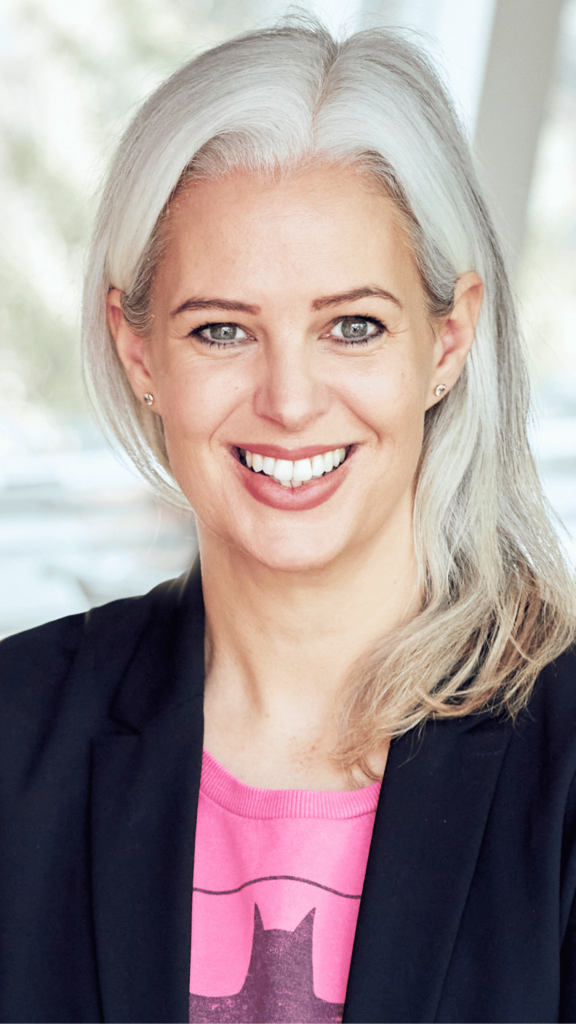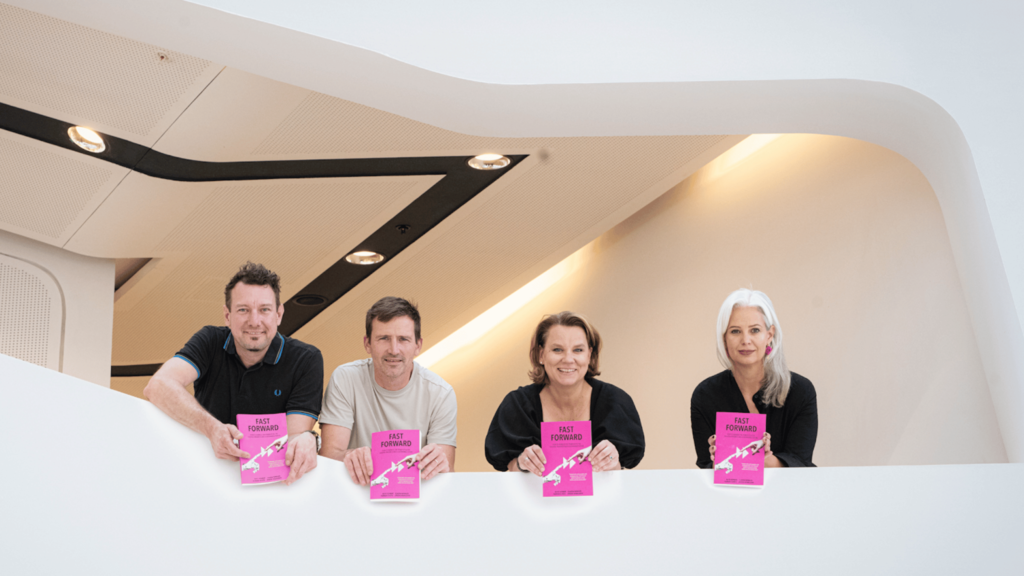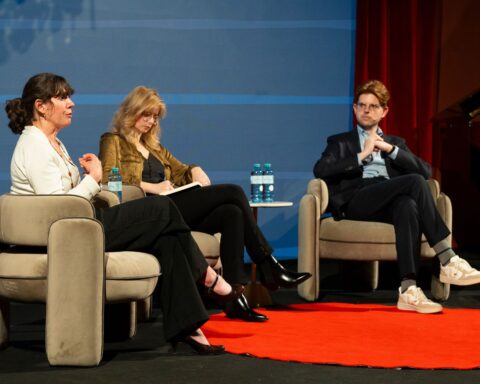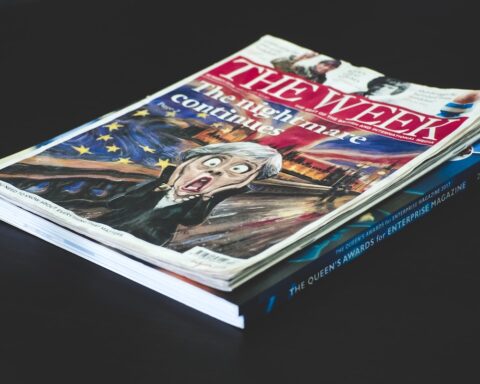In this modern age, everyone appears obsessed with Artificial Intelligence and the possibilities it brings. Log on to most news sites, and you’re guaranteed to encounter a seemingly never-ending list of articles on how such technology is projected to change our world — if it is not already in the process of doing so. In another especially telling sign of its rising influence in our society, Collins Dictionary chose the abbreviation ‘AI’ as its word of the year for 2023. And let’s not even talk about how our LinkedIn feeds have become saturated with posts about hacks to work more efficiently with AI tools like ChatGPT and Midjourney.
However, if you ask leading sustainability expert and thought leader on sustainable transformation, Alice Schmidt, the focus of machine intelligence should not only revolve around the impacts on business and tech. The policy advisor wants to draw attention to the major opportunities and risks that AI yields upon our societal well-being and the environment. Given the current circumstances, it’s not hard to see why this is a very important point. With 2024 emerging as the biggest election year in history and also tipped to be the hottest year on record as climate change intensifies, the timing of AI’s rise is indeed striking.
Exploring the impacts on humanity and the planet
It’s a bright morning in late Spring when I meet Schmidt in a café close to Vienna’s famous Schönbrunn gardens. We are here to discuss a book Schmidt recently co-wrote: ‘Fast Forward: How to Harness the Power of AI for Societal Progress and a Sustainable Future’.
The book states that our society is entering a defining moment which demands sustainable transformation, and that technological innovations — most notably AI — can play a crucial role towards this goal. However, ‘Fast Forward’ also recognises a major dilemma in that there is not sufficient overlap between the sustainability and tech worlds, which could lead to dire consequences for humanity and the environment alike. As a result, it presents a strong argument to not only bridge the gap between the sectors but also streamline their goals. Very true to such a multidisciplinary mission, ‘Fast Forward’ brings together diverse perspectives. Indeed, the three other writers are the entrepreneur Claudia Winkler, AI specialist Florian Schütz and life scientist Jeroen Dobbelaere.

Despite having co-authored a book on AI and being extremely knowledgeable on the subject, Schmidt readily admits she “never saw herself as a tech person”. She prefers instead to label herself a “bigger picture person”. After spending the past 25 years working on projects at the crossroads of economics, sustainability, tech, and societal inclusion with 100 major organisations in the private and public sectors — everything from Coca-Cola and Ferrero to the UN and EU Commission — she says her strengths lie in being able to understand and analyse complex topics. This is exactly what sparked her interest in AI. Hence, Schmidt tells me, it is really not about the technology itself, but about “everything else”. As a futurist (in other words someone who make predictions about future scenarios by studying current trends and circumstances), Schmidt tells me she initially grew interested in tech due to her curiosity about how AI’s knock-on effects and unintended consequences would play out in the real world, thereby raising important questions for humanity and the planet alike.
On this note, it is worth acknowledging that when it comes to discussions on AI, they often evolve into debates about whether the technology will lead to a brighter or bleaker future. Schmidt says this is something that her latest book has sought to avoid, instead opting to grant a balanced perspective on a complex and rapidly evolving situation. As AI technology continues to advance, it is crucial that we equip ourselves with the knowledge and understanding needed to navigate its impact on our world. Otherwise, a major risk is that AI could be used to primarily benefit a “tiny group of people” (i.e. those running Big Tech or powerful militaries) as opposed to supporting the needs of the greater good across the globe.
The digital divide
In a similar sense, Schmidt warns that instead of evening the playing field, such new technology could be used to simply reinforce current societal power structures. As the senior policy advisor states, AI is “a field dominated by men”. She gives the example of ‘female’ AI assistants which have been created largely by male designers. The likes of Siri and Alexa have sparked controversy for reinforcing the harmful stereotype of the nice, subservient woman — including by responding to abusive language from users with nauseatingly cute phrases like “You make me blush”.
According to her, such incidents raise concerns not only for women but diversity as a whole. As she notes “we see what male dominance has done to [..] the structures and the world as it is”. Based on her research, Schmidt has found little sign that those who run AI platforms are actively attempting to break away from such structures. She also does not foresee the situation improving unless there are very intentional attempts, not least facilitated by strong regulation, to make both these companies and platforms themselves more inclusive.

Promising examples of how AI can benefit society and the environment.
At this particularly gloomy moment in our conversation, Schmidt must have seen my face fall. The MIT Climate Ambassador is quick to point out that there are several tech firms working on “amazing” AI solutions to make our world a better place. This includes platforms that offer education and healthcare support in low-income areas. There are apps which predict forest fires and hurricanes, thereby saving human lives. Meanwhile, other AI-powered solutions by the likes of Prewave and Naturemetrics are striving to make companies’ supply chains more sustainable and transparent. A non-profit organisation, The Ocean Cleanup, founded by an 18-year old Dutch teenager now uses AI to make removal of floating plastic waste from the world’s oceans more efficient. It has the ambitious goal of removing 90% of such waste from the ocean by 2040. Then there’s a Romanian start-up called .lumen which has designed headsets that could potentially surpass guide dogs in supporting people with visual disabilities — a huge global market made up of an estimated 40 million people.
Schmidt is keen to stress that AI can make a major difference to the societal inclusion of people living with disabilities. According to her, features like voice-to-text can be a powerful game changer for those with hearing disabilities. She notes several apps which use image-to-audio functions to help blind and partially-sighted people. The possibilities really do seem limitless and deserve to be celebrated. However, as a ‘bigger picture person’ Schmidt reminds me that there are important caveats to all of this.

There’s more to the story
For one, there’s the “digital divide”. Although Schmidt acknowledges that AI technology can be used to promote a multitude of key social and environmental causes and “could totally […] narrow the gap” between wealthy and poorer countries, she points out that the ability to access such platforms changes dramatically depending on where you live. As Schmidt says, “AI tools are used mainly by those who have at least broadband connections and, you know, a number of gadgets, which most people in the world, frankly, don’t have.”
Likewise, Schmidt also believes “we can’t outsource solving the world’s biggest problems to AI.” There’s a lot more to the story, not least the question of ethics and regulation. Deciding what is an acceptable and responsible way to use these tools is not an easy matter. As Schmidt states, a vision of how AI tools can create a better future varies greatly depending on who you ask. She notes that the CEO of a fossil fuel company will have a different answer to the UN Secretary-General António Guterres.
Before wrapping up our interview, I ask Schmidt if she has any final thoughts. She emphasizes the need for a collective mindset shift and to start seeing ourselves as ‘technologists’. Instead of viewing it as merely a matter of innovation, AI needs to be viewed as a force which will affect “the world of work, education, science, health, social inclusion, […] the environment.” As such, we cannot leave AI solely to techies. She believes that a “net positive scenario,” where the benefits of AI are shared globally, is possible. But steering the tech in such a direction will require “massive, deliberate efforts.”





